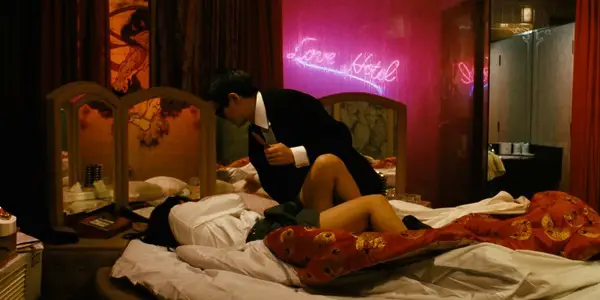It’s always fun to see the kinds of journeys filmmakers take from their early to later work, often showing a progression that more hints at an economic trajectory rather than an artistic one. For example, the director Yôjirô Takita, who directed the YoYo Ma-inspired drama film Departures, which won the Best International Film Oscar, had directed more than two dozen pinku films before creating something that had broken into international fame and by and large reflected the kinds of films he actually wanted to make. Shinji Sômai‘s much more well-known coming-of-age films perhaps give Love Hotel a surprise factor on his resume. While it is definitely a radical turn away from the filmmaker’s more well-known sensibilities, it still shows hints of the kind of gentle filmmaker he was in Moving and Typhoon Club.
From Pinku to Domestic Drama
Love Hotel starts off like a purely mad and angry, titillating pinku affair, taking its stylistic hints from Kenji Fukasaku and Seijun Suzuki, tying in a Yakuza angle that sets up a pulpy premise and then slowly softens into an intimate love story and domestic drama. If that seems disappointing for a pinku film, don’t worry — there’s still plenty of sex and bondage involved. It just doesn’t dive into the depravity of violence that most pinkus revel in and that make them what they are. Somai’s blocking in interiors creates feelings of entrapment that exacerbate the claustrophobic feelings of domesticity. The neon lighting and eclectic set design of the opening pulpy sequences are contrasted with the rest of movie’s much more sober color palette, which reflects the two distinct sides of the central characters Tetsuro (Minori Terada) and Nami (Noriko Hayami)’s lives.

Signature Styles
Somai’s affixed-camera long takes mix with this blocking to see his characters build a scene through their movements and proximity to each other. It also allows for their environment to be a direct factor in the way they approach the scene. This especially helps in turning the sex sequences within the film into naturalistic depictions of human dynamics rather than artificial sensations. The Hitchockian element of the film, which stems from Nami’s desire for a re-enactment of the violent night she had with Tetsuro drives her to imitate the aesthetics of that night — she wears the same clothes, talks and behaves in the same way she did, and even carries handcuffs that Tetsuro secured on her.
Conclusion
Love Hotel is generally an outlier in Somai’s filmography, but it’s not devoid of the choices that make his cinema potent. One thing that always seems to shine through in his movies is the way he elicits emotion through his characters in direct manners. His movies by and large are about common problems. The rekindling of a past passion rumbles under the surface of Love Hotel and it guides the way both Tetsuro and Nami play games, conversate, and eventually come back together in the end.
Love Hotel is not currently available to stream in the U.S.
Does content like this matter to you?
Become a Member and support film journalism. Unlock access to all of Film Inquiry`s great articles. Join a community of like-minded readers who are passionate about cinema - get access to our private members Network, give back to independent filmmakers, and more.